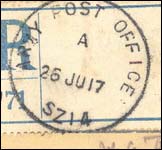![Checkpoint Charlie Berlin by Francisco Antunes [CC-BY-SA-2.0 (http://creativecommons.org/licenses/by-sa/2.0)], via Flickr https://flic.kr/p/j3Maw2 [cropped] Checkpoint Charlie Berlin by Francisco Antunes [CC-BY-SA-2.0 (http://creativecommons.org/licenses/by-sa/2.0)], via Flickr https://flic.kr/p/j3Maw2 [cropped]](https://www.exportlawblog.com/images/checkpoint_charlie.jpg) Over the holidays I watched on Amazon “The Man in the High Castle,” a television adaptation of Philip K. Dick’s Hugo Award winning novel of the same name about an alternate reality in which Germany and Japan won World War II. So I was a little surprised when, thanks to a reader, I stumbled into an alternate reality in the non-award winning Code of Federal Regulations where the Cold War never ended and the Berlin Wall never fell. The author of this fiction was not an esteemed science fiction writer like Philip K. Dick but instead our very own Customs and Border Protection (“CBP”) who are apparently are too busy throwing innocent people in jail to keep up with (vaguely) current events.
Over the holidays I watched on Amazon “The Man in the High Castle,” a television adaptation of Philip K. Dick’s Hugo Award winning novel of the same name about an alternate reality in which Germany and Japan won World War II. So I was a little surprised when, thanks to a reader, I stumbled into an alternate reality in the non-award winning Code of Federal Regulations where the Cold War never ended and the Berlin Wall never fell. The author of this fiction was not an esteemed science fiction writer like Philip K. Dick but instead our very own Customs and Border Protection (“CBP”) who are apparently are too busy throwing innocent people in jail to keep up with (vaguely) current events.
Of course, I’m referring to section 19 C.F.R. § 4.75(c) which details countries for which vessels may not be cleared until complete manifests and shippers export declarations are filed. And on that list you will find an entry for this country:
German Democratic Republic (Soviet Zone of Germany and Soviet Zone sector of Berlin)
(Not to mention the defunct Union of Soviet Socialist Republics and the equally vanished Polish People’s Republic and Czechoslovakia.)  Oddly, the CPB amended these regulations in 2000, more than 11 years after the Soviet sector went poof, and yet the reference to East Berlin, Czechoslovakia, the Polish People’s Republic and the USSR all remained. I’m wondering whether I will find lurking in the somewhere in CPB’s rules a provision dealing with exports to the Confederate States of America.
The practical impact of CPB living more than 25 years in the past may be limited. Under the current rules set forth in 15 C.F.R. § 30.4 the EEI must be filed through AES in all instances prior to the vessel leaving the United States, whether it is bound for England, France, Lilliput, Middle Earth, Flatland, Prussia, Rhodesia, Tattoine, Naboo, Endor, Grand Fenway or Freedonia.

 Posted by
Posted by  Category:
Category: 

![Lamp, Typewrite and Specs by John Levanen[CC-BY-SA-2.0 (http://creativecommons.org/licenses/by-sa/2.0)], via Flickr https://www.flickr.com/photos/54814530@N00/8314704680/[cropped] Lamp, Typewrite and Specs by John Levanen[CC-BY-SA-2.0 (http://creativecommons.org/licenses/by-sa/2.0)], via Flickr https://www.flickr.com/photos/54814530@N00/8314704680/[cropped]](https://www.exportlawblog.com/images/typewriter2.jpg)
 If there is anything that qualifies as a true urban legend in the export areas, it’s the surprisingly widespread belief that shipments to overseas APO and FPO addresses aren’t exports. Of course, that’s no more true than the belief that the fate of a rider on an equestrian statute can be determined by the position of the horse’s hooves. (
If there is anything that qualifies as a true urban legend in the export areas, it’s the surprisingly widespread belief that shipments to overseas APO and FPO addresses aren’t exports. Of course, that’s no more true than the belief that the fate of a rider on an equestrian statute can be determined by the position of the horse’s hooves. (

